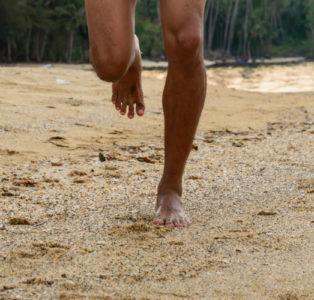 Although many places require shoes to be worn upon entry, it’s possible that some days you have the chance to go barefoot for most or all of the day. Is it a good idea to go barefoot for extended stretches, or could all this time without shoes actually increase our risk of an injury? In today’s blog, we take a closer look on whether or not it’s a good idea to go barefoot all day.
Although many places require shoes to be worn upon entry, it’s possible that some days you have the chance to go barefoot for most or all of the day. Is it a good idea to go barefoot for extended stretches, or could all this time without shoes actually increase our risk of an injury? In today’s blog, we take a closer look on whether or not it’s a good idea to go barefoot all day.
Is It Safe To Go Barefoot All Day?
One of Dr. Silverman’s favorite phrases in regards to footwear is “We didn’t come out of the womb wearing shoes.” What he means by this is that we aren’t born with shoes, and our ancestors were able to survive and thrive without a pair of Nikes. Now, on the other side of the coin, their bodies and their feet were better adapted for going barefoot all day. Because they didn’t wear shoes, different muscles groups were regularly tested and their feet became conditioned to walking without footwear.
Now, if you regularly go barefoot or you run with a minimalist shoe, your feet may not be as stressed by going barefoot all day. However, if you’re oftentimes in comfortable and supportive shoes, you may find that your dogs are barking a little louder after a long day going barefoot. It’s unlikely that you’ll experience anything more than mild or moderate soreness the next day, but know that going barefoot for long periods when you’re not used to it can lead to increased strain on areas that aren’t conditioned for the task.
This idea falls in line with other sentiments we’ve had in regards to footwear, which is that you should not significantly change your footwear routine. If you want to condition different muscle groups and go barefoot more often, do so gradually over time by slowly increasing the time you spend going barefoot each day. Abrupt changes to your footwear choices, whether that’s going barefoot or breaking in a new shoe, can end up overstressing different areas of your foot. Making this change gradually gives new muscle groups more time to get used to the new pressure and stress patterns.
And finally, we should note that going barefoot for extended periods can pose a risk to your foot health because of the natural protection that a shoe offers. If you step on a sharp object or even step directly on a small pebble, this can lead to cuts and bruises. Again, it’s unlikely to be a major injury, but these wounds can cause problems for your feet, especially if you have other underlying health conditions like circulatory issues or diabetes. If you’re in a safe environment it’s probably no big deal to go barefoot, but if you’ll be traversing rocky or more natural terrain, consider wearing a shoe to help protect your foot a bit.
It’s unlikely that going barefoot will cause internal problems for your feet, especially if you gradually switch your footwear choices, but shoes do offer some protection from the elements that could pose a health risk to your feet. Make smart choices and look out for your feet, and we’re confident they’ll remain healthy.